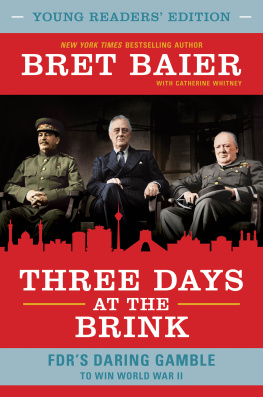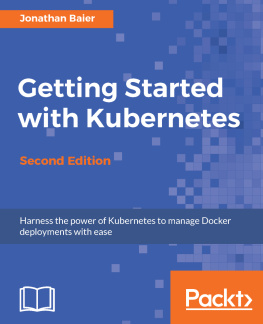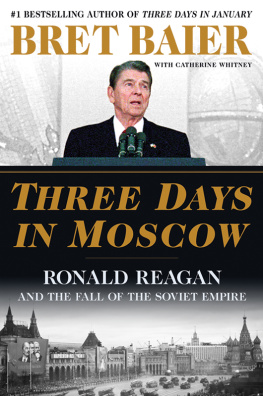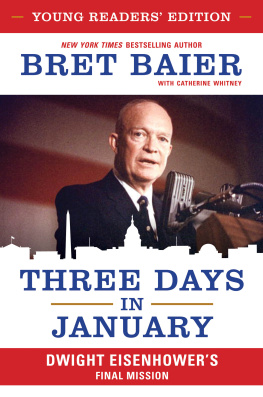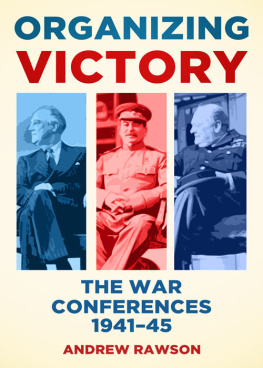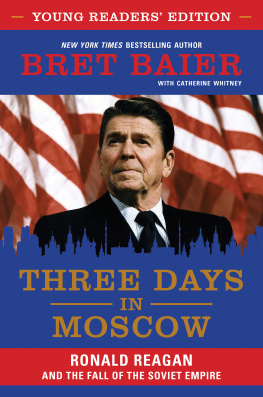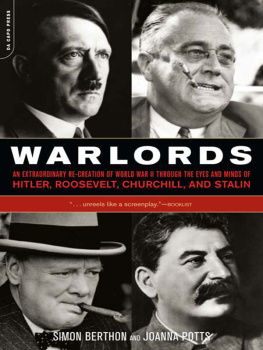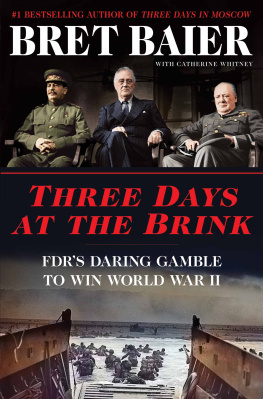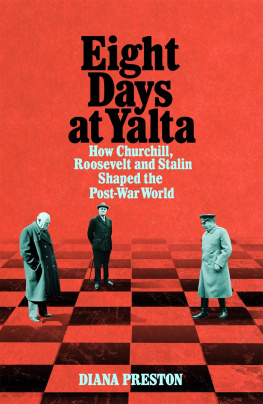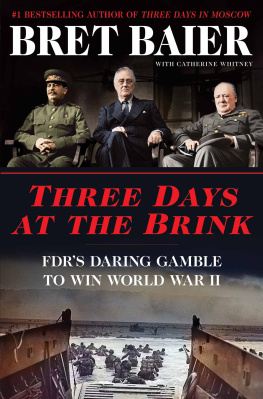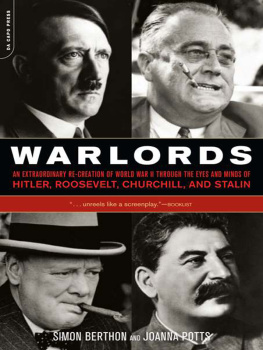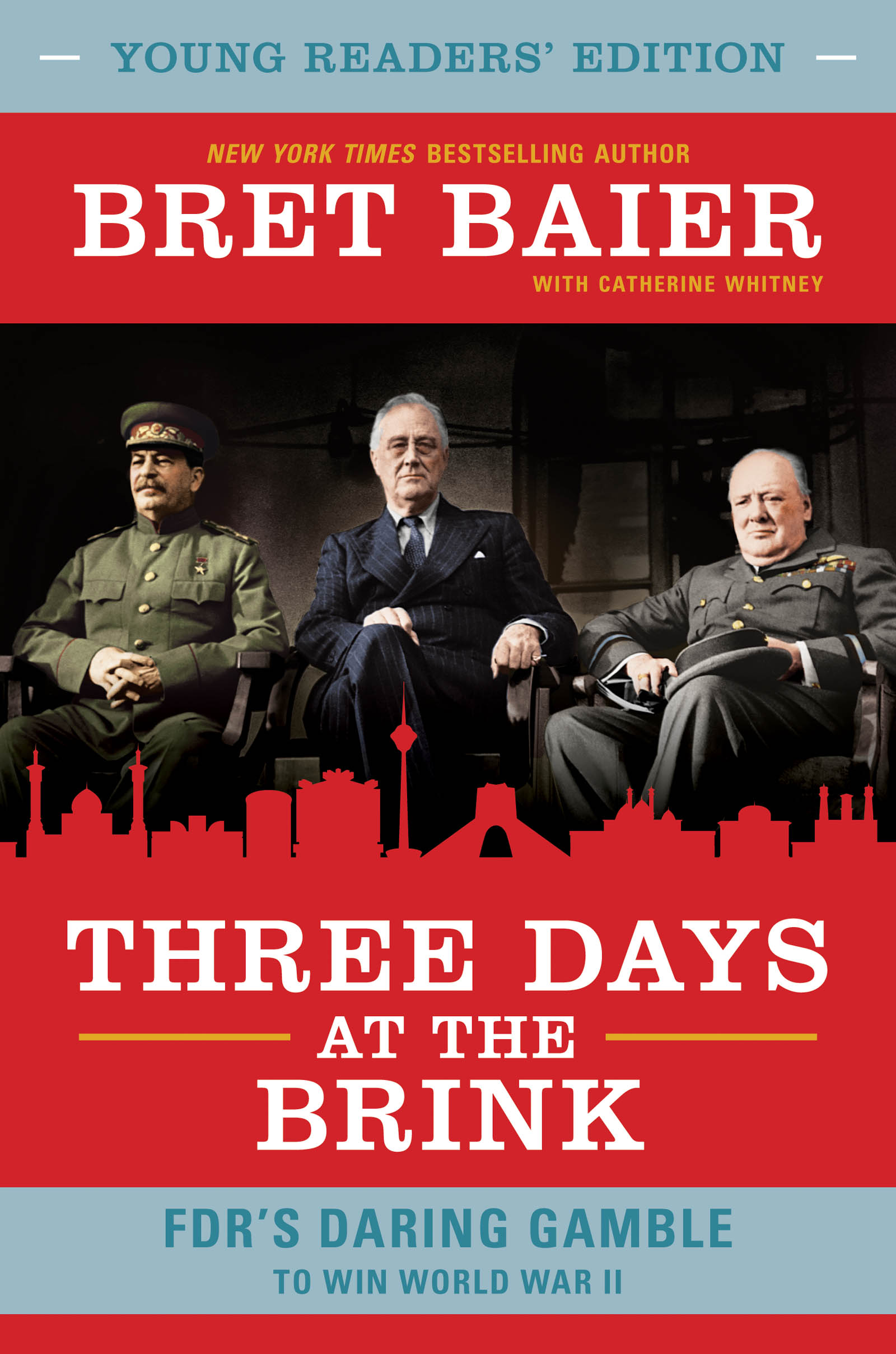
To the veterans of World War II and D-Day who died
on the beaches of Normandy and to those who are still living today.
Thank you for your service, sacrifice, and for saving the world.
Contents
The past is ever present. As the United States and the world paused to commemorate the seventy-fifth anniversary of D-Daythe most important battle of World War III was completing my work on this book. As the leaders of the free world stood on the cliffs above the Normandy beaches where they were once united in common cause, I reflected on all that brought them to that point.
I wrote this book because I wanted to capture that moment of time. It was during the three critical days of the Tehran Conference where the decision was made to launch Operation Overlord, the battle that came to be known as D-Day. World War II still has an influence on our lives, although it is growing more distant. The Department of Veterans Affairs reports that those who served in that war are dying at a rate of 372 veterans per day. Sixteen million of them fought; only 600,000 remain. How do we preserve the experience of that time and explain its meaning for the present and for future generations? I always tell my two sons, Paul, age twelve, and Daniel, age nine, that history is a living thing, and Ive found that to be true for myself. I was born twenty-six years after D-Day, but growing up I felt as if it was part of my story too. Respecting and revering the veterans who came to be known as the Greatest Generation was standard practice. Today, as the remaining veterans of D-Day live out their final years, we can see in their faces our greatest legacy as a nation.
Writing about history involves visiting a world from the past. As I found with my other books on Dwight Eisenhower and Ronald Reagan, nothing helps with the experience more than a trip to a presidential librarythis time, a trip to the Franklin D. Roosevelt Presidential Library and Museum in Hyde Park, New York. It is located about forty miles north of West Point, above the Hudson River, and is a beautiful setting in all seasons. When I toured the grounds, I felt as if I was back in FDRs time. The stately family home, now showing the wear of age, is just a few yards from the museum, and walking the long driveway its easy to picture Roosevelt, his legs shrunken by polio and encased in steel braces, struggling for hours at a time, trying to walk again. He never succeeded, but he also never stopped trying.
Driving the back roads of the property, one can imagine FDR doing the same in his 1936 Ford Phaeton convertible with special hand controls. He loved that car and often drove along the side roads and hills of Hyde Park, taking the curves at breakneck speed.
But the true work takes place in the reading room of the library, with its aged books lining the walls. There are over seventeen million documents in the FDR archives, and almost one million of them are available digitally. But there is something special about being there and holding the documents in your hands. Unlike at the Eisenhower Library, gloves are not required. The archivists thought gloves would make it hard to turn pages, which is true. In the library are the drafts of speeches, always of special interest to me, with edits scribbled in Roosevelts hand; the urgent cables at critical moments of the war; and the correspondence between the president and Winston Churchill and Joseph Stalin, some of the letters in longhand. Collected in bound books are the records of the Tehran Conference with Churchill and Stalin, the centerpiece of this book. The firsthand accounts of observers and translators give readers a sense of being in the room as the three men fiercely debated the wisdom of a cross-Channel invasion on Western Europe. Trying to put the reader in the room is what the Three Days series is all about.
Much has been written about this period. A staff member at the FDR Library told me he thought Roosevelt was the most written-about person in American history, and I can understand why hed think that. Many great historians have explored aspects of his life and contribution. I dont aspire to match the genius of historians, but intend to put my personal journalists spin on the great events of Roosevelts day. I am not a historian. I am a reporter of history. And this book, like the other two in the series, hopefully sheds light on a crucial moment in time and one of Americas most important leaders.
As the third book in my presidential series, Three Days at the Brink: FDRs Daring Gamble to Win World War II rounds out the story of twentieth-century leadership and is a dramatic prelude to my other booksPresident Dwight D. Eisenhower at the early, most dangerous days of the Cold War, with Stalin breaking all the promises hed made to Roosevelt; and President Ronald Reagan, bringing an end to the Cold War with dramatic diplomatic strategy alongside his Soviet counterpart, Mikhail Gorbachev. Like Eisenhower and Reagan, Roosevelt was a leader who rose above his political party to fulfill a higher purpose in the presidency. Looking at it today, with fresh problems around the world, it can feel as if in one way or another were still having the same debatesstill focused on a worldview from seventy-five years ago. In the living history of our times, we study the past to create a better future.
Bret Baier
October 2019
NOVEMBER 28, 1943
THE FUTURE WAS UNCERTAIN. After more than four years of fighting, it was not clear which side would win World War II. Hitlers armies had surged across Western Europe into Russia and the Mediterranean. The Allies had fought hard and scored some important victories, but they could not afford to miscalculate against an enemy so undaunted by defeat, so relentless in the face of overwhelming odds. They needed the kind of decisive win that would put the Nazis on their heels.
President Franklin D. Roosevelt, British prime minister Winston Churchill, and Soviet marshal Joseph Stalinthe Big Three leaders of the Allied countriesmet in Tehran, Iran, to try to figure out how to navigate this crisis point in World War II. Each of the three came with his own vision of the future. Stalin insisted that a second front be opened in Europe as soon as possible. Churchill didnt agree; he thought the Mediterranean would be a better place to fight. FDR was in the middle, leaning toward Stalins view, but unsure on the question of timing. One thing was clear: the next great battle was on the horizon, and those three days in Tehran would determine its course. Hitler could still win the war. How would they stop him?
They knew they had to work together, but it was an uneasy alliance. Churchill felt he deserved accommodation since Britain had held off the Nazis virtually alone in the early years of the war. Stalin argued that Russia had suffered a true invasion of its land, costing millions of lives, and a second front would relieve the pressure on the war-weary Soviets.
FDR, who was meeting Stalin for the first time, was determined to show the Soviet leader a full measure of respect, even if his attentiveness hurt Churchills feelings. Roosevelt had been trying to meet with Stalin for more than a year. He wanted Stalins support in the war with Japan, which America was fighting mostly alone, with limited help from Britain.
The urgency of the meeting could not be overstated. If the Big Three did not reach an agreement, the Allied effort could falter. They needed a united policy at a time when the Soviets were fighting for their lives and Hitlers domination of Western Europe had remained largely unchallenged.

